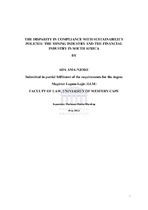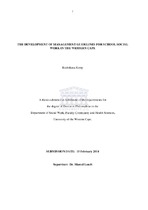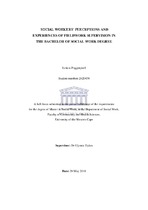| dc.contributor.advisor | Conradie, Ina | |
| dc.contributor.author | Costella, Cecilia V. | |
| dc.date.accessioned | 2023-03-02T10:58:57Z | |
| dc.date.available | 2023-03-02T10:58:57Z | |
| dc.date.issued | 2010 | |
| dc.identifier.uri | http://hdl.handle.net/11394/9676 | |
| dc.description | Masters in Public Administration - MPA | en_US |
| dc.description.abstract | Social Funds are a type of intervention whereby development agencies transfer control over project resources and decision-making to community groups and other local actors who formulate and implement those projects based on their own assessment of priorities. Social Funds were among the first programs to incorporate notions of participation of the poor and civil society in projects financed by the
multilateral finance institutions. Several approaches argue that community participation in development projects leads to interventions that meet the priorities of the beneficiaries more accurately (which results in more sustainable project outcomes) and empowers participants. However, those who criticise participation claim that participatory processes might be contained by the implementing agency as well as by power and economic differences within the community itself. The development agency has its own priorities, organizational goals, structure, and a complex external environment, all of which may limit its ability to implement participatory processes. This could lead to the use of the participation 'label' without substantive inclusion of the beneficiaries and, ultimately, hinder the potential advantages of this approach'
This research aims to assess the role of Social Funds' organizational and institutional characteristics for community participation processes in development projects. The research is based on a case study of the Peruvian Social Fund, FONCODES, and utilizes a qualitative data collection approach. It mainly relies on semi-structured interviews with FONCODES' staff and community members, unstructured interviews with experts, and analysis of operational documents' The research concludes that several organizational and institutional characteristics affect community participation in FONCODES projects but the direction of this influence depends on how specific areas of the organization's
context are structured as well as on political variables in the institutional environment. | en_US |
| dc.language.iso | en | en_US |
| dc.publisher | University of the Western Cape | en_US |
| dc.subject | Community Participation | en_US |
| dc.subject | Community-Driven Development | en_US |
| dc.subject | Social Funds World Bank | en_US |
| dc.subject | Development Agency | en_US |
| dc.subject | Social Funds | en_US |
| dc.subject | Organizational Systems and Procedures | en_US |
| dc.subject | Social Funds' Institutional Environment | en_US |
| dc.subject | FONCODES | en_US |
| dc.subject | Peru | en_US |
| dc.subject | Inter-American Development Bank | en_US |
| dc.title | Participation development in social funds: A case study of the Peruvian Social fund | en_US |
| dc.rights.holder | University of the Western Cape | en_US |




